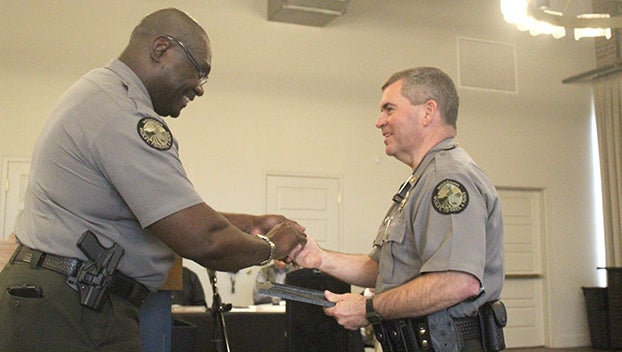Not guilty: Senate acquits president; Hyde-Smith votes in support of Trump
Published 6:56 pm Wednesday, February 5, 2020
U.S. Sen. Cindy Hyde-Smith, of Brookhaven, cast votes Wednesday that led to the impeachment acquittal of President Donald Trump, bringing to a close only the third presidential trial in American history with votes that split the country, tested civic norms and fed the tumultuous 2020 race for the White House.
With Chief Justice John Roberts presiding, senators sworn to do “impartial justice” stood at their desks to state their votes for the roll call — “guilty” or “not guilty” — in a swift tally almost exclusively along party lines. Visitors, including the president’s allies, watched from the crowded gallery. Roberts read the declaration that Trump “be, and is hereby, acquitted of the charges.”
Hyde-Smith a Republican U.S. senator who lives in Lincoln County today, said she planned to vote to acquit President Trump on the two Articles of Impeachment that were the subject of a more than two-week trial in the United States Senate.
“I will vote to acquit President Donald J. Trump on both Articles of Impeachment presented by House Democrats,” Hyde-Smith said Wednesday in a speech on the Senate floor. “I have listened carefully to the arguments presented by House Democratic managers and the White House defense team. Those prosecuting the President failed on a legal and constitutional basis to produce the evidence required to undertake the very serious act of
“This trial exposed that pure political partisanship fueled a reckless investigation and the subsequent impeachment of the President on weak, vague, and noncriminal accusations,” she said. “The Democrats’ case—which lacked the basic standards of fairness and due process—was fabricated to fulfill their one, long-held hope to impeach President Trump.
“We should all be concerned about the dangerous precedent and consequences of convicting any president on charges originating from strictly partisan reasons.
“The Founding Fathers warned against allowing impeachment to become a political weapon. In this case, House Democrats crossed that line. Rejecting the Abuse of Power and Obstruction of Congress articles before us will affirm our belief in the impeachment standards intended by the Founders.
“With my votes to acquit President Trump, justice will be served. The Senate has faithfully executed its constitutional duties to hear and judge the charges leveled against the President.
Hyde-Smith said she was hopeful that Congress can set aside “this flawed partisan investigation, prosecution, and persecution” of Trump.
“The people of Mississippi and this great nation are more interested in us getting back to doing the work they sent us here to do,” she said.
The outcome followed months of remarkable impeachment proceedings, from Speaker Nancy Pelosi’s House to Mitch McConnell’s Senate, reflecting the nation’s unrelenting partisan divide three years into the Trump presidency.
Senate Democratic leader Chuck Schumer said there will always be “a giant asterisk next to the president’s acquittal” because of the Senate’s quick trial and the Republicans’ unprecedented rejection of witnesses for an impeachment.
A majority of senators expressed unease with Trump’s pressure campaign on Ukraine that resulted in the two articles of impeachment. But two-thirds “guilty” votes would have been needed to reach the Constitution’s bar of high crimes and misdemeanors to convict and remove Trump from office. The final tallies fell far short.
On the first article of impeachment, abuse of power, the vote was 52-48 favoring acquittal. The second, obstruction of Congress, also produced a not guilty verdict, 53-47.
Only one Republican, Mitt Romney of Utah, the party’s defeated 2012 presidential nominee, broke with the GOP.
Romney choked up as he said he drew on his faith and “oath before God” to vote guilty on the first charge, abuse of power. He voted to acquit on the second.
Both Bill Clinton in 1999 and Andrew Johnson in 1868 drew cross-party support when they were left in office after impeachment trials. Richard Nixon resigned rather than face sure impeachment including from his own party.
Among senators running for the Democratic presidential nomination, Bernie Sanders, Elizabeth Warren and Amy Klobuchar dashed back from New Hampshire to vote.
During the nearly three-week trial, House Democrats prosecuting the case argued that Trump abused power like no other president in history when he pressured Ukraine to investigate Biden and his son, Hunter Biden, ahead of the 2020 election.
Pelosi was initially reluctant to launch impeachment proceedings against Trump when she took control of the House after the 2018 election, dismissively telling more liberal voices that “he’s not worth it.’’
Trump and his GOP allies in Congress argue that Democrats have been trying to undercut him from the start.
Trump’s approval rating, which has generally languished in the mid- to low-40s, hit a new high of 49 percent in the latest Gallup polling, which was conducted as the Senate trial was drawing to a close. The poll found that 51 percent of the public views the Republican Party favorably, the first time the GOP’s number has exceeded 50 percent since 2005.
The Associated Press contributed to this report.





